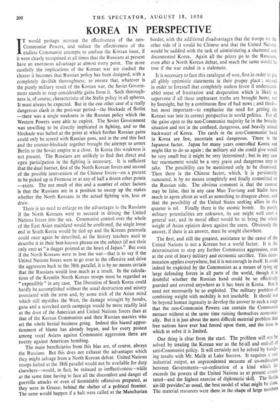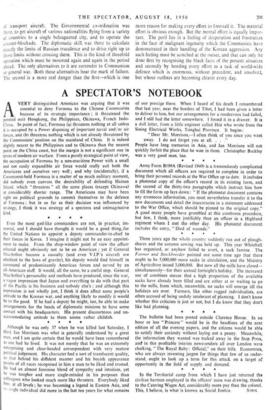KOREA IN PERSPECTIVE
IT would perhaps increase the effectiveness of the non- Communist Powers, and reduce the effectiveness of the endless Communist attempts to confuse the Korean issue, if it were clearly recognised at all times that the Russians at present have an enormous advantage at almost every point. The more carefully the implications of the Korean war are studied the clearer it becomes that Russian policy has been designed, with a completely devilish thoroughness, to ensure that, whatever is the purely military result of the Korean war, the Soviet Govern- ment stands to reap considerable gains from it. Such thorough- ness is, of course, characteristic of the Stalin policy in all spheres. It must always be expected. But in the one other case of a really dangerous clash in the post-war period—the blockade of Berlin —there was a single weakness in the Russian policy which the Western Powers were able to exploit. The Soviet Government was unwilling to be directly implicated in fighting, and so the blockade was halted at the point at which further Russian gains could only be scored with Russian guns, and in the end this fact and the counter-blockade together brought the attempt to annex Berlin to the Soviet empire to a close. In Korea this weakness is not present. The Russians are unlikely to find that direct and open participation in the fighting is necessary. It is sufficient that the dual barrier, first of the North Korean forces and second of the possible intervention of the Chinese forces—on a pretext to be picked up in Formosa or at any of half a dozen other points —exists. The net result of this and a number of other factors is that the Russians are in a position to sweep up the stakes whether the North Koreans in the actual fighting win, lose or draw.
There is no need to enlarge on the advantages to the Russians if the North Koreans were to succeed in driving the United Nations forces into the sea. Communist control over the whole of the East Asian mainland would be confirmed, the single loose end in South Korea would be tied up and the Korean peninsula could once again be described, as the history teachers used to describe it in their best-known phrase on the subject (if not their only one) as " a dagger pointed at the heart of Japan." But even if the North Koreans were to lose the war—that is to say if the United Nations forces were to go over to the offensive and drive the aggressors back to the 38th parallel, it is by no means certain that the Russians would lose much as a result. In the calcula- tions of the Kremlin North Korean troops must be regarded as " expendible " in any case. The liberation of South Korea could hardly be accomplished without the usual destruction and misery associated with the term and, by some trick of the Asian mind which still mystifies the West, the damage wrought by bombs, guns and a scorched earth campaign would be more readily laid at the door of the American and United Nations forces than at that of the Korean Communists and their Russian masters who set the whole bestial business going. Indeed this biased appor- tionment of blame has already begun, and for every protest among vocal Asians against Communist aggression there are twenty against American bombing.
The main beneficiaries from this bias are, of course, always the Russians. But this does not exhaust the advantages which they might salvage from a North Korean defeat. United Nations troops halted at the 38th parallel would not be available for duty elsewhere—would, in fact, be reduced to ineffectiveness—while at the same time having to face all the discomfort and danger of guerrilla attacks or even of formidable offensives prepared, as they were in Greece, behind the shelter of a political frontier. The same would happen if a halt were called at the Manchurian border, with the additional disadvantages that the troops on the other side of it would be Chinese and that the United Nations would be saddled with the task of administering a shattered and discontented Korea. Again all the prizes go to the Russians, even after a North Korean defeat, and much the same would be true if the war ended in a stalemate.
It is necessary to face this catalogue of woe, first in order to put all glibly optimistic statements in their proper place ; second in order to forestall that completely useless (even if understand. able) sense of frustration and desperation which is likely to supervene if all these unpleasant truths are brought home, not by foresight, but by a continuous flow of bad news ; and third–. but most important—to emphasise the need for getting the Korean war into its correct perspective in world politics. For all the gains open to the non-Communist majority lie in the broader situation and not in the confined, dangerous, and heavily mined backwater of Korea. The cards in the non-Communist hand in Korea are few, uncertain and dangerous. There is the Japanese factor. Japan for many years controlled Korea and might like to do so again ; the military aid she could give would be very small but it might be very 'determined ; but in any case her rearmament would be a very grave and dangerous step to take. The possibility can be mentioned only to be dismissed. Then there is the Chinese factor, which, it is persistently rumoured, is by no means completely and finally committed on the Russian side. The obvious comment is that the rumour may be false, that in any case Mao Tse-tung and Stalin have much to agree about as well as something to disagree about, and that the possibility of the United States seeking allies in this quarter is nil. Finally there is the atomic bomb. Its purely military potentialities are unknown, its use might well start a general war, and its moral effect would be to bring the whole weight of Asian opinion down against the users. Obviously the answer, if there is an answer, must be sought elsewhere.
The first, .and still the greatest, assistance to the cause of the United Nations is not a Korean but a world factor. It is the determination to stop any further Communist aggression, even at the cost of heavy military and economic sacrifice. This deter- mination applies everywhere, but it is not enough in itself. It could indeed be exploited by the Communists as a means of tying up large defending forces in all parts of the world, though it is doubtful whether the Russian hand could be so effectively guarded and covered anywhere as it has been in Korea. But it need not necessarily be so exploited. The military problem of combining weight with mobility is not insoluble. It should not be beyond human ingenuity to develop the answer to such a stage that the non-Communist Powers can contain the Communist menace without at the same time ruining themselves economic- ally. But it is just about the most difficult material problem that free nations have ever had forced upon them, and the time in which to solve it is limited.
One thing is clear from the start. The problem will not be solved by treating the Korean war as the be-all and end-all of anti-Communist policy. It will certainly not be solved by bandy- ing insults with Mr. Malik at Lake Success. It requires a vast industrial output, an unprecedented measure of co-ordination between Governments—co-ordination of a kind which far exceeds the powers of the United Nations as at present consti- tuted—and the highest exercise of diplomatic skill. The Berlin air-lift provides' as usual, the best model of what might be done. The material resources were there in the shape of large numbers of transport aircraft. The Governmental co-ordination was there, to get aircraft of various nationalities flying from a variety of countries to a single beleaguered city, and to operate the counter-blockade. The diplomatic skill, was there to calculate exactly the limits of Russian truculence and to drive right up to those limits without crossing them. This is the kind of threefold operation which must be mounted again and again in the period ahead. The only alternatives to it are surrender to Communism or oeneral war. Both these alternatives bear the mark of failure. The second is a more real danger than the first—which is one more reason for making every effort to forestall it. The material effort is obvious enough. But the mental effort is equally impor- tant. The peril lies in a feeling of desperation and frustration in the face of malignant ingenuity which the Communists have demonstrated in their handling of the Korean aggression. Any such feeling must be scotched at the outset, and that can only be done first by recognising the black facts of the present situation and secondly by bending every effort to a task of world-wide defence which is enormous, without precedent, and unsolvel, but whose outlines are becoming clearer every day.



































 Previous page
Previous page